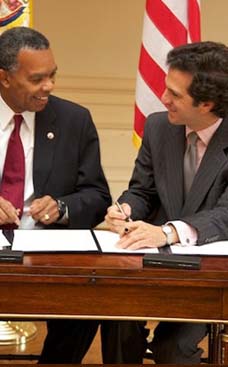
It was Wisconsin where Spiro ended up by chance after a stint in the Peace Corps, where he embarked on his database career. Attending the University of Wisconsin, where he was working on his Masters' in forestry, Spiro ended up working as a lab manager on a PDP 11. He took some computer science classes and met another Microsoft-Technical-Fellow-to-be, David DeWitt, who was teaching there. Spiro finished his Forrestry degree and then got another Masters' in Computer Science. He moved to Massachusetts in the mid-80s to take a job at Digital Equipment Corp. and ultimately became Technical Director for the DEC Rdb and DEC DBMS products. Spiro says he considers the coming decade to be very much like the 1970s, in terms of being the "golden era of data management." The big data challenge, going forward is to manage data collections that are growing exponentially in size. "The old techniques don't work as well. We need to be thinking about mining in real time, the implications of cheaper storage and scaling across thousands of nodes," he says. We'll be experimenting with lots of different techniques and technologies, Spiro notes. Already, some of these projects are rising to the forefront - things like OData, Dallas and the continuously-evolving SQL Azure. "We need to unlearn many of the things of the past 20 years, and then re-learn them," Spiro concludes.
Mali RPCV Peter Spiro is expert in database internals at Microsoft
Microsoft Big Brains: Peter Spiro
By Mary Jo Foley | May 14, 2010, 12:59pm PDT
It has been a while since I posted one of my profiles of Microsoft's Technical Fellows (they're a tough group to pin down). But the series is continuing, as I plow through the full list of 22.
Just before retiring from day-to-day responsibilities at Microsoft in 2008, Chairman Bill Gates said that he expected Microsoft's Technical Fellows to get a lot more publicly visible - now that they wouldn't be living in his shadow. While some of the Microsoft fellows already have been active on the public-speaking circuit, many of them are not widely known outside the company.
Last year I launched this series - "Microsoft Big Brains" - to help remedy that shortcoming. In the coming weeks, I am hoping to profile as many of the company's tech fellows as to whom I can get access. Slowly but surely, I'm making my way through the list.
Microsoft's Technical Fellows came to the company via a variety of different routes. Some of them run divisions inside the company; some focus on particularly thorny technical issues that may span a variety of product units. Regardless of where they sit in the organization, the fellows all have been charged with helping Microsoft craft its next-gen products and strategies, much the way that Gates used his regular "Think Weeks" to prioritize what Microsoft needed to do next.
This Week's ‘Big Brain': Peter Spiro
Claim to Fame: One of the foremost experts in database internals
How Long You've Been With Microsoft: 16 years
More About You: Worked on a variety of database teams and projects at the company, including SQL Server, SQL Server Compact (for mobile devices), the WinFS file system, and CloudDB (which morphed into SQL Azure)
Your Biggest Accomplishment (So Far) at Microsoft: Instrumental in the development of the SQL Server 7.0 release and "the mini-culture around SQL Server at Microsoft"
Team(s) You Also Work With: SQL Server, SQL Azure
Why stay at Microsoft? "I like the breadth of the playground," Spiro says. Claiming he bores easily (in spite of his multi-decade focus on databases), "I am a floater," he says. "I can work on whatever catches my eye." These days, "I'm like the village elder," he adds.
One of the leading database experts at Microsoft, Technical Fellow Peter Spiro, used to be a charcoal maker in Mali. Then he was a corn farmer in Wisconsin. What a long, strange trip it's been, Spiro acknowledges.
It was Wisconsin where Spiro ended up by chance after a stint in the Peace Corps, where he embarked on his database career. Attending the University of Wisconsin, where he was working on his Masters' in forestry, Spiro ended up working as a lab manager on a PDP 11. He took some computer science classes and met another Microsoft-Technical-Fellow-to-be, David DeWitt, who was teaching there. Spiro finished his Forrestry degree and then got another Masters' in Computer Science. He moved to Massachusetts in the mid-80s to take a job at Digital Equipment Corp. and ultimately became Technical Director for the DEC Rdb and DEC DBMS products.
"I figured I'd work at DEC for 20 to 30 years," Spiro recalls.
But then Oracle bought Rdb and Spiro was at a crossroads: Stay in a satellite office of a new company or look for something new. At that point, Microsoft was just starting to get serious about the database market, with former Chief Technology Officer David Vaskevitch looking to bring on a hundred database experts to get Microsoft in the game so it could compete with Oracle and IBM. Microsoft hired Spiro in 1994 as "the storage guy and change agent," he says. His job was to help Microsoft with everything from organizational structure, to hiring, to developing business plans. In between all that, he also served as dev lead, dev manager and product unit manager for the storage and relational engines of SQL Server.
It wasn't until SQL Server 7.0 that Microsoft got serious about being an enterprise-level player in the database market. The oft-delayed SQL Server 7.0 was a major (as in 80 percent of the code changed) version of Microsfot's database. Microsoft changed more than just the core database code with that release, Spiro says; it changed the people, the processes and the architecture around SQL Server.
Spiro hasn't worked only on big teams and big projects. Two years ago, he shed his direct reports so he could work on smaller, up-and-coming initiatives. He also worked with the WinFS and SQL Azure teams. WinFS - one of the intended components of Longhorn/Windows Server 2008 - never materialized. But pieces of the WinFS technology have been incorporated into subsequent SQL Server, Velocity (part of the Windows App Fabric), StreamInsight complex event-processing and other product/technology releases, Spiro says.
Managers learned a lot of lessons from WinFS - like don't bet a shipping product on technology that is still in incubation - Spiro says. "With these kinds of big, hard projects, you get two to three times the learnings you get in a typical five-year project," he adds.
"WinFS was almost too creative" and ahead of its time, Spiro says. But as a result of its people and ideas, "the SQL Server organization had a renaissance of incubation and innovation."
Spiro says he considers the coming decade to be very much like the 1970s, in terms of being the "golden era of data management." The big data challenge, going forward is to manage data collections that are growing exponentially in size.
"The old techniques don't work as well. We need to be thinking about mining in real time, the implications of cheaper storage and scaling across thousands of nodes," he says. We'll be experimenting with lots of different techniques and technologies, Spiro notes. Already, some of these projects are rising to the forefront - things like OData, Dallas and the continuously-evolving SQL Azure.
"We need to unlearn many of the things of the past 20 years, and then re-learn them," Spiro concludes.












